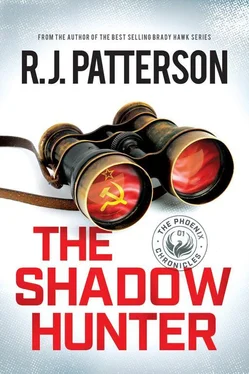Barbara Wheeler, Norris’s highly diplomatic Secretary of State, clasped her hands in front of her and cleared her throat before speaking. “Mr. President, I believe what’s going on here is a lot of saber rattling. Kim Yong-ju would only know how to give the order to fire a nuclear weapon if it was on the video games he reportedly plays around the clock. I’m sure this is all just a big smoke screen.”
Norris stroked his chin. “Smoke screen for what?”
“I don’t know,” she said. “Maybe they don’t want us to pay attention to the nuclear reactor they’re building in the northeastern part of the country.”
“Is that really happening?” he asked.
“As we speak, though from everything I’ve read, they have no idea what they’re doing.”
James Miller, the vice-chairman of the Joint Chiefs of Staff, leaned forward in his chair and raised his hand to speak. Norris nodded at Miller.
“I believe what Madam Secretary Wheeler is trying to say is that Kim Yong-ju couldn’t find his own ass with a map,” Miller said. “But we don’t have any intel that can confirm or deny that North Korea is in possession of nuclear warheads. Therefore, I’d recommend that we launch a pre-emptive strike.”
“If they’re bluffing, we’d just be starting another conflict that no American wants,” Norris said.
Brent Gaston, the Naval Chief of Operations, templed his fingers and shifted in his seat. “None of us want another conflict, including General Miller,” he said. “But this one might be necessary. We need to make sure the tail isn’t wagging the dog here. A quick strike would remind Kim Yong-ju who’s the real world power today and end these shenanigans. I think if we used a strong show of force, he’d back down and think twice about puffing his chest out, even if he never intended to throw a punch.”
Wheeler shook her head. “I think that’s a mistake. North Korea should be ignored until they decide to play with the rest of the world. Wasting our military’s time on them only validates Kim Yong-ju’s opinion of himself. He’s not interested in war, but just being recognized as a member of the world’s leadership might be enough for him.”
Norris scowled. “But we can’t let this become a precedent that every rogue leader will follow in the future.”
“Of course not, sir,” Wheeler said. “We can find a way to help Kim Yong-ju save face while not appearing to bow to his tantrums.”
“And how do you propose we do that?” Norris asked.
“I have a few ideas, starting with an initiative we’ve launched with several countries in that part of the world to work together on innovative technology ideas,” she said. “We could invite North Korea with the caveat that they back down from the war mongering rhetoric and stop threatening our ships in that region.”
Miller tapped his pen on the table and exaggerated a sigh. “Sir, diplomacy doesn’t work with the North Koreans, especially Kim Yong-ju. If you let this slide, he’ll try to play you again. And every time he shares a message or a video that hints that he might have a nuclear weapon or a WMD, we’ll be jumping. If you let this game begin, I can promise you that it’ll be something that haunts you all the way to the ballot box next November.”
Norris stood and paced behind his seat as he considered both sides.
“Anyone else have a different perspective they’d like to share?” he asked.
A few other cabinet members offered support of either Wheeler or Miller’s ideas, but nothing fresh or innovative emerged.
“This situation can’t be that black and white,” Norris said. “There has to be a way we can keep the peace without instigating a protracted conflict.”
Miller chuckled.
“Is something funny, General?” Norris asked.
“You act as if anything about a conflict with North Korea would last any length of time. We could send a wave of bombers into Pyongyang, and we’d never hear from Kim Yong-ju or any other North Korean leaders for a long time. I’d say we could send them back to the Stone Age, but I’m pretty sure they’re still living in it.”
Norris waved off Miller. “As the world’s peacekeepers, we have a tremendous responsibility to respect every nation’s sovereignty, not to mention make sure that our conflicts remain between military might and avoid civilian casualties at all costs.”
“Sir, with all due respect, if North Korea has nuclear capabilities, your virtuous stance won’t bring much comfort to the thousands of Americans that will die and the millions more that will be grieving such devastating loss.”
“At the end of the day, everyone in this administration has to sleep with the choices we make,” Norris shot back. “And defaulting toward war every single time we sense a threat would be a grave mistake.”
Miller placed his hands palm down on the table and pursed his lips. “Sir, exactly how many times have I recommended we engage the enemy since I’ve been a part of your Joint Chiefs of Staff?”
Norris shrugged. “I guess I can’t remember any specific occasion.”
“That’s because I never have,” Miller said. “I didn’t suggest taking action when the Russian carrier ships were cruising closer than they should have to Alaska. I didn’t suggest action when China was caught selling weapons to militants in the Middle East. And I didn’t even think it was worth a ten-minute discussion when Venezuela chose to announce it was developing nuclear capabilities to defend itself against the ‘imperial aggressors to the north.’ So, if I’m suggesting we take some action, it’s because the situation warrants it.”
Wheeler shook her head. “This is what I was talking about earlier, sir. The general has been searching for a reason to justify those huge military expenditures in the most recent budget.”
Miller set his jaw and glared at Wheeler. “Our military is why Americans don’t worry about getting bombed in the middle of the night and experiencing a nuclear winter. We’re keeping this country safe, and I’m sorry if you think that’s a waste of taxpayer dollars. But I happen to think it’s the best money we spend.”
Wheeler narrowed her eyes and leaned forward. “Now you listen to me, I—”
“Knock it off, you two,” Norris said. “Do I need to remind everyone that the reason you’re here is to advise me? You give me your ideas and suggestions, and then I decide. That’s how it works. You’ve both made your position clear, and now I’m going to tell you what we’re going to do.”
A hush fell over the room, the tension was palpable. Norris took a deep breath and then sat down.
“Here’s what we’re going to do,” he said. “General Miller, I want you to put together a plan for a pre-emptive strike, and I want it on my desk by four o’clock this afternoon. Understand?”
A faint smile crept across Miller’s lips. “Yes, sir.”
“Secretary Wheeler, you can work on a backup plan in case I change my mind,” Norris said. “As much as I don’t want to do this, I feel like it’s the best course of action. Now, everyone, let’s get to work.”
General Miller nodded at the president and gave him a faint smile along with a fist pump. Wheeler, however, remained in her seat.
“Barbara, are you all right?” Norris asked her as he prepared to leave the room.
She bit her lip and stared at the wall in front of her. “You can’t listen to Miller. He’ll lead you astray.”
“Come on, Barbara. You know what I’m facing here. I don’t want the last thing people remember before they go to the polls later this year is that I’m weak on national security.”
She sighed. “You can’t use polling numbers to govern. The people put you in this office to make decisions, not bend whichever way the wind blows. Grow a backbone and be a leader. And that starts with you standing up to Miller. If you’re worried about how people will perceive you now, just wait until you put us in another Vietnam—an unpopular, unwinnable, and unnecessary war.”
Читать дальше












